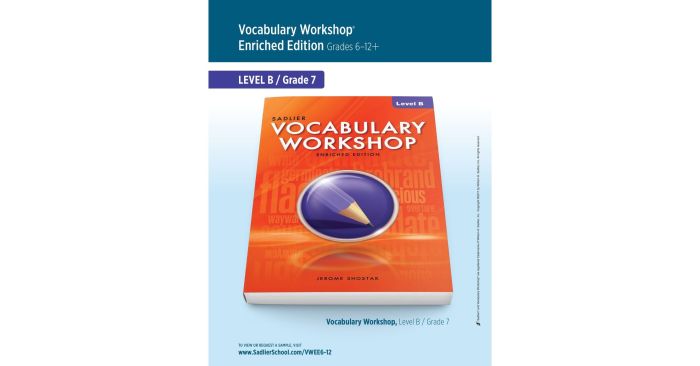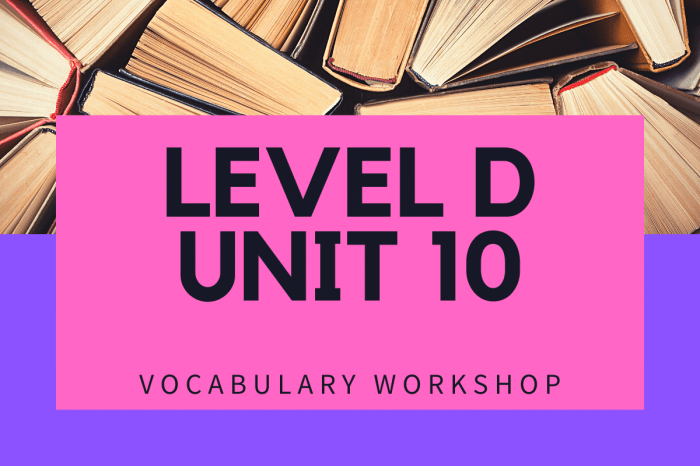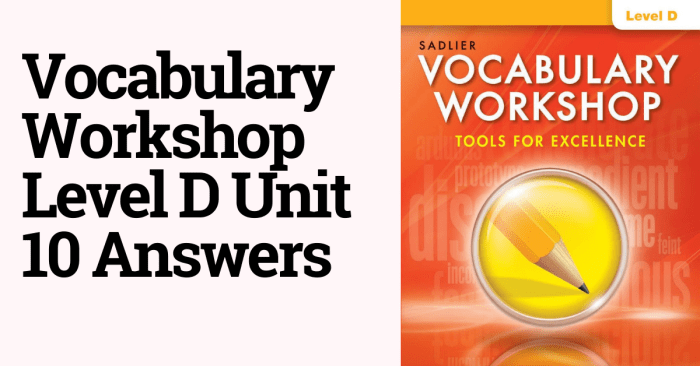Embarking on Vocabulary Workshop Level D Unit 10, we delve into the multifaceted world of vocabulary development, exploring its significance, acquisition strategies, assessment techniques, and the transformative role of technology in vocabulary instruction.
This comprehensive unit provides educators and learners with a wealth of knowledge and practical tools to enhance vocabulary proficiency, empowering them to navigate the complexities of language and communication effectively.
Vocabulary and Meaning

Vocabulary development is crucial in language learning as it enables individuals to express themselves effectively, comprehend written and spoken language, and expand their knowledge base.
Teaching vocabulary can be facilitated through various activities, including: reading texts, playing word games, using flashcards, and engaging in discussions.
Types of Vocabulary
Vocabulary can be categorized into different types, each with its unique characteristics:
- Academic Vocabulary:Specialized terms and concepts used in academic settings, such as “hypothesis” and “dissertation.”
- Technical Vocabulary:Industry-specific terms and jargon used in specialized fields, such as “algorithm” in computer science or “mortgage” in finance.
- Colloquial Vocabulary:Informal language used in everyday conversations, such as “hang out” and “chill.”
Vocabulary Acquisition

Vocabulary acquisition is the process of learning new words and their meanings. There are many different ways that learners acquire vocabulary, including:
- Reading: Reading is one of the most effective ways to acquire new vocabulary. When learners read, they are exposed to new words in context, which helps them to understand the meaning of the words and how they are used.
- Listening: Listening to native speakers is another great way to acquire new vocabulary. When learners listen to native speakers, they are exposed to new words in context, which helps them to understand the meaning of the words and how they are used.
- Speaking: Speaking is also a great way to acquire new vocabulary. When learners speak, they are forced to use new words in context, which helps them to remember the meaning of the words and how they are used.
- Writing: Writing is also a great way to acquire new vocabulary. When learners write, they are forced to use new words in context, which helps them to remember the meaning of the words and how they are used.
Role of Context in Vocabulary Acquisition, Vocabulary workshop level d unit 10
Context is very important in vocabulary acquisition. When learners are exposed to new words in context, they are more likely to understand the meaning of the words and how they are used. This is because context provides learners with information about the meaning of the words, as well as how they are used in different situations.
Strategies for Helping Learners Remember New Vocabulary
There are many different strategies that can help learners remember new vocabulary. Some of these strategies include:
- Repetition: Repetition is one of the most effective ways to remember new vocabulary. When learners repeat new words, they are more likely to remember them.
- Spaced repetition: Spaced repetition is a technique for remembering new vocabulary that involves reviewing the words at increasing intervals. This helps to keep the words in learners’ memories.
- Flashcards: Flashcards are a great way to review new vocabulary. When learners use flashcards, they can test themselves on the meaning of the words and how they are used.
- Mnemonic devices: Mnemonic devices are memory aids that can help learners to remember new vocabulary. Mnemonic devices can include rhymes, songs, or images.
Vocabulary Assessment

Assessing vocabulary knowledge is crucial for understanding language proficiency. Various methods can be employed to evaluate students’ vocabulary, each with its strengths and challenges.
Assessment Methods
- Cloze Procedure:A text with missing words is presented, and students fill in the blanks with appropriate vocabulary.
- Multiple Choice:Students select the correct meaning or usage of a word from a list of options.
- Matching:Students match words with their definitions or synonyms.
- Written Production:Students write sentences or paragraphs using specific vocabulary words.
- Oral Production:Students speak about a topic and incorporate targeted vocabulary.
Challenges
Vocabulary assessment poses several challenges:
- Context Dependence:Word meanings can vary depending on the context, making it difficult to assess vocabulary knowledge in isolation.
- Depth of Knowledge:Assessments often focus on surface-level understanding, neglecting deeper comprehension of word nuances and usage.
- Cultural Differences:Vocabulary acquisition and usage can vary across cultures, potentially affecting assessment outcomes.
- Subjectivity:Some assessment methods, such as written production, rely on subjective judgments, introducing potential bias.
Vocabulary
Vocabulary refers to the words that make up a language, and it is an essential component of communication. Teaching vocabulary effectively requires a well-structured lesson plan that incorporates various strategies to engage students and promote retention.
Lesson Plan for Teaching Vocabulary
An effective lesson plan for teaching vocabulary should include the following components:
- Introduction:Begin by introducing the new vocabulary words and providing their definitions.
- Interactive Activities:Engage students in interactive activities, such as games, discussions, or role-playing, to reinforce the meaning of the new words.
- Contextualization:Provide examples and context to show how the words are used in real-world situations.
- Practice Exercises:Assign practice exercises, such as fill-in-the-blank or matching exercises, to assess student understanding.
- Assessment:Conduct a formal or informal assessment to evaluate student progress and provide feedback.
Technology and Vocabulary

Technology has emerged as a powerful tool for vocabulary instruction, providing innovative ways to engage students and enhance their vocabulary learning.
One of the key benefits of using technology for vocabulary teaching is its ability to provide personalized learning experiences. Vocabulary-learning apps and websites allow students to learn at their own pace, focus on specific areas of vocabulary, and receive instant feedback on their progress.
Examples of Vocabulary-Learning Apps and Websites
- Quizlet: A popular app and website that allows users to create and share flashcards, take quizzes, and play games to practice vocabulary.
- Duolingo: A gamified language-learning app that includes vocabulary exercises and interactive lessons.
- Memrise: A spaced repetition app that uses scientific methods to help users retain vocabulary over time.
These platforms offer a wide range of vocabulary exercises, including flashcards, matching games, fill-in-the-blank activities, and interactive stories, making vocabulary learning more engaging and interactive.
FAQ Resource: Vocabulary Workshop Level D Unit 10
What are the benefits of developing vocabulary?
Enhanced communication skills, improved comprehension, increased academic success, and broader knowledge base.
How can technology facilitate vocabulary learning?
Interactive apps, online dictionaries, and gamified platforms provide engaging and personalized learning experiences.
What are the challenges of assessing vocabulary knowledge?
Measuring depth of understanding, distinguishing between active and passive vocabulary, and accommodating individual learning styles.